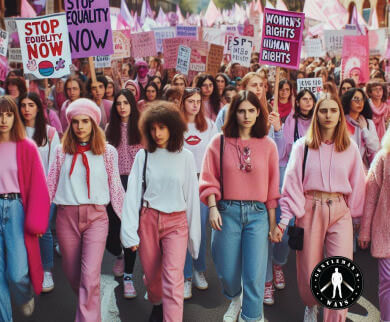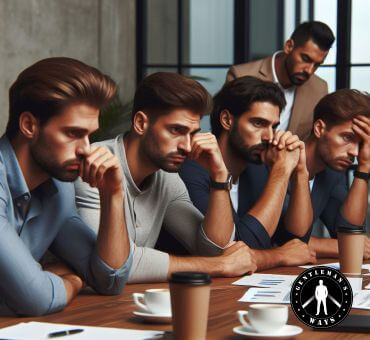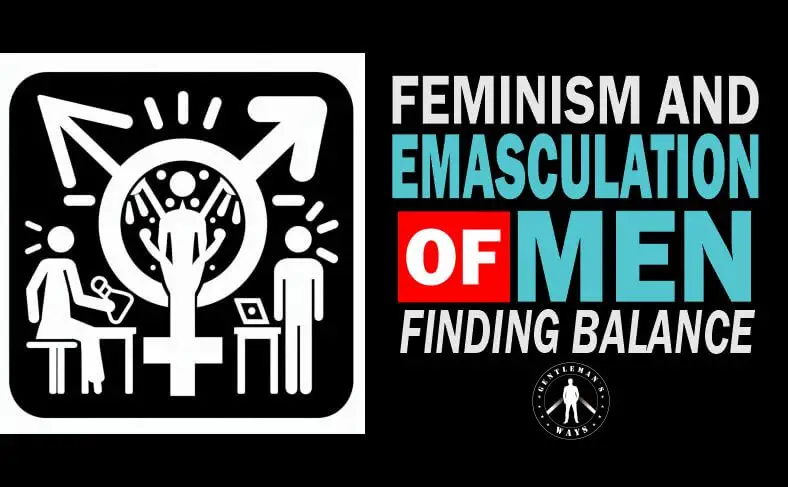Last updated on April 23rd, 2025 at 09:07 am
The intersection of feminism and male emasculation is a controversial topic that stirs strong emotions on both sides of the gender debate. But there is a way out.
Get familiar with the delicate balance between feminism and male emasculation, looking into the impact on gender roles and societal norms.
As feminism seeks to flatten the roles of men and women through gender equality and challenges traditional power dynamics, some men are jittery that the movement is a threat to their masculinity, leading to feelings of emasculation.
We will discuss how the feminist movement has bent societal views of masculinity, inspiring discussions about what it means to be a man in modern society.
By examining the historical context of feminism according to The Conducts of Life, the cultural implications of emasculation, and how men respond to feminism, we can gain a deeper insight into this frosty relationship.
While feminism has made a great mark in promoting gender equality, some believe it has also led to the emasculation of men in society.
This controversy stretches to topics like changing gender norms, male insecurity, and the need to redefine the meaning of manliness in the modern world.
Suggested: Want to Be a Real Man? Be Emotionally Intelligent
Key Takeaways
- Feminism challenges traditional gender roles, which some believe contributes to male emasculation
- Critics argue that while feminism promotes gender equality, it also raises concerns about the impact on traditional male identities and societal norms.
- Finding a balance between feminism and male identity involves promoting gender equality while respecting the diverse experiences and challenges faced by men in a changing social landscape.
An Overview of Feminism and Emasculation
Some critics say feminism emasculates men by challenging traditional gender roles. Feminism aims to dismantle patriarchal systems that have historically privileged men and oppressed women.
They believe feminism threatens men’s masculinity by advocating for women’s rights and equality.
However, to be clear, let’s refresh our minds on what feminism and emasculation are in the real sense.
Feminism is a socio-political movement aimed at establishing and achieving equality between genders, in particular, pushing for women’s rights.
Historically taking root in various waves, feminism has metamorphosed into wage equality, reproductive rights, and intersectionality from the fight for fundamental legal rights, including property ownership, voting, and more.
The movement is eager to dismantle the paratracheal grip on society which is thought to drive discrimination against women.
The bottom line of the feminist movement is equal rights and treatment for both genders.
Emasculation on the other hand is a perception held by men who feel that their patriarchal power, status, and authority in society is being threatened.
Masculinity of course is often tied to traditional ideas of masculinity, which relates to male identity with dominance and control.
Emasculation can occur in many scenarios, such as socio-economic shifts that challenge traditional male roles including:
- Changing family dynamics that promote shared responsibilities
- Cultural narratives that empower women while simultaneously threatening established male privilege.
The fear of emasculation may lead to defensive reactions from some men, who perceive women’s advancements as personal crises to their own identities.
The tension between feminism and emasculation highlights the disturbance within gender dynamics.
While feminism seeks to reestablish power balances through promoting equality, the fear of emasculation can be in its way.
Understanding these definitions helps us unbiasedly analyze their intersection and how both affect men and society.
The societal implications of both concepts are obvious, as they influence how men and women perceive gender roles and navigate their identities within modern culture.

Feminism is a social and political movement advocating for the equality of all genders, focusing primarily on addressing and dismantling the systemic inequalities and injustices faced by women.
It seeks to promote equal rights and opportunities in various spheres of life, including politics, employment, education, and personal relationships.
The Modern Intersection of Feminism and Emasculation
In modern society, the interaction between feminism and emasculation shows a sensitive discourse laced with emotions and volatile tendencies, especially in popular culture, social media, and current events.
The feminist movement traditionally focused on advocating for women’s rights and challenging gender norms, has increasingly engaged with issues surrounding masculinity and male identity.
As these ideas unfold, an obvious backlash has cropped up among certain men who perceive feminism as a threat to traditional masculinity, leading to reactions ranging from rejection to adaptation.
Popular culture takes a position in shaping perceptions of both divide and the resultant fear of emasculation.
Media Representations
Through various media representations, men are portrayed in a light that reflects vulnerability or emotional depth, challenging the hyper-masculinity that has historically dominated societal views.
Shows and films that are themed on male fragility or modification of masculinity have ignited hot debates about how these narratives affect male self-perception amidst feminist ideologies.
In this scenario, some men may feel emasculated or marginalized, questioning their roles in relationships, workplaces, and society at large.
Social Media
Social media further heightens these discussions, providing a perfect platform for both divides to voice their experiences regarding masculinity and feminism.
Hashtags and trending topics often reveal a polarized situation where some men express legitimate concerns about feeling sidelined in the evolving dialogue around gender equality.
Conversely, others rally in support of feminist causes, embracing a modified masculinity that is supportive rather than an egoistic show of power.
These interactions underpin how men negotiate identity in a society characterized by shifting norms, where the definition of being a man is continuously reshaped.
Real-life Implications
Individual stories and case studies corroborate the real-life implications of this intersection.
For some, rallying around feminist principles leads to a more balanced understanding of self-worth and relationships, encouraging healthier dynamics.
Others grapple with feelings of confusion or resentment as traditional constructs of masculinity become questioned. Certainly, understanding the crevices and crannies of this intersection is essential in having a more productive dialogue that acknowledges and values the experiences of all genders.
Does Feminism Undermines Traditional Masculinity?
Instead of emasculating men, feminism aims to empower them to embrace a fuller range of emotions and identities, fostering healthier and more inclusive expressions of masculinity.
Genuine feminism is not about diminishing men. It challenges rigid gender roles that promote toxic masculinity and limit authentic self-expression for both men and women.
Recommended: Things that Make You a High Value Man
How does Feminism Benefit Men?
Feminism promotes gender equality, benefiting everyone by allowing people of all genders to thrive and be themselves.
The idea of male emasculation comes from the belief that challenging traditional gender roles threatens men’s identity and self-worth.
Men may feel emasculated when encouraged to show emotion or vulnerability, as these traits are often stigmatized as “feminine.”
Men who don’t conform to traditional masculine ideals, like being assertive or dominant, may face discrimination and marginalization.
Related: A Quick Look at Positive Masculinity
Emasculation of Men not Caused by Feminism

It is important to recognize that male emasculation is not caused by feminism itself, but rather by the toxic social norms and expectations that uphold patriarchal systems.
How Men Can Support Feminism
Despite the misconception that feminism is only a women’s issue, men play strategic roles in advancing gender equality and dismantling patriarchy.
By engaging with feminism and advocating for women’s rights, men can support the movement and challenge harmful gender norms that affect everyone.
Here are some ways that men can support feminism:
1. Educate Yourself: Learn about feminist theory and history to understand women’s issues and the movement’s goals. Read feminist books, articles, and essays, attend gender equality workshops and lectures, and engage in conversations with women and non-binary people about their experiences.
Related: How Male Emasculation Affects Relationships
2. Listen to Women: Pay attention to women’s voices and perspectives. Amplify their voices and support their goals to become a better ally for gender equality.
3. Challenge Sexism: Speak out against sexist attitudes, behaviors, and language. Confront harmful stereotypes and support initiatives for diversity, inclusion, and equity.
4. Support Women’s Leadership: Advocate for women in leadership roles in politics, business, relationships, and religion.
Related: How to Take the Toxic Masculinity Test
Finding Balance between Feminism and Male Emasculation

Finding a balance between feminism and male emasculation involves recognizing the rights and equality of women while also acknowledging and respecting the experiences and challenges faced by men.
This means promoting gender equality without diminishing the importance of masculinity or perpetuating harmful stereotypes about men.
Moving Towards Understanding and Collaboration
In the quest for gender equality, it is sacrosanct to maintain an environment of discussion and understanding between feminists and men.
This collaborative approach can of course challenge prevailing stereotypes and misconceptions about both movements.
By having discussions that are respectful and accommodating rather than divisive, people from all backgrounds can discover common ground, thereby paving the way for meaningful partnerships.
Such collaborations can dismantle the idea that feminism is antagonistic towards men, instead portraying it as a path towards mutual empowerment.
Community Programs
One practical solution to promote this understanding is the establishment of community programs that focus on shared goals.
Initiatives that bring together people of different gender identities can help facilitate conversations around masculinity and its evolving definitions.
Workshops, open forums, and support groups can provide spaces for both feminists and men to express their views, share their experiences, and recognize the value of each other’s perspectives.
These programs emphasize that redefining masculinity does not have to be a threat to feminist ideals; rather, it can reinforce them by encouraging men to adopt more empathetic and nurturing behaviors.
Educational Initiatives
Educational initiatives also play a crucial role in bridging the gender divide. Curriculums that promote gender studies at various educational levels promote awareness and respect for all identities.
Through such education, younger generations can learn about the importance of gender equality while understanding the gray areas of feminism and masculinity.
This knowledge can empower them right from the tender age to engage in collaborative efforts aimed at creating balanced environments.
By working together, feminists and men alike can dismantle misconceptions that contribute to gender disparities, thus reinforcing the idea that feminism champions the rights of all individuals, regardless of gender.
Frequently Asked Questions
How does feminism impact male identity?
Feminism challenges traditional gender roles, encouraging men to explore aspects beyond traditional masculinity.
Can feminism lead to male emasculation?
Feminism seeks gender equality, not emasculation. Embracing feminist ideals can empower men to redefine their roles positively.
How can we strike a balance between feminism and male identity?
Promoting mutual respect and open dialogue can help navigate the complexities of gender dynamics in society effectively.
Why is finding balance between feminism and male emasculation important?
Achieving a harmonious coexistence benefits both genders, fostering understanding, equality, and mutual empowerment in modern society.
Final Words from Gentsways
The discussion on feminism and male emasculation underscores the importance of sustaining a balanced approach within gender dynamics.
Encouraging dialogue between feminists and men is important for challenging stereotypes and promoting mutual understanding.
When we value collaboration through community programs and educational initiatives, a future can be achieved where feminism continues to empower everyone, while men remain confident and do not feel emasculated.
Embracing feminism does not automatically result in emasculating men but rather encourages a redefinition of masculinity that is inclusive and empowering for all genders.
References:
- https://www.palomar.edu/telescope/2017/04/12/todays-feminism-movement-has-devolved-into-men-hating/
- https://www.ncbi.nlm.nih.gov/pmc/articles/PMC2767117/
Pyo Merez is a men’s lifestyle enthusiast and writer about the gentleman’s place and impact on society. Raised by a distinguished gentleman dad, he offers unique insights into how the mind of a gentleman works and how societal norms shape gentlemen’s identity and vice versa.
Through his insightful articles, Pyo taps into the depths of gentleman culture to provide perspectives on etiquette and manners in modern society.

